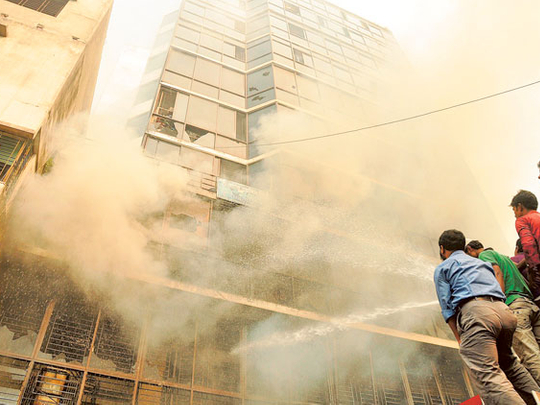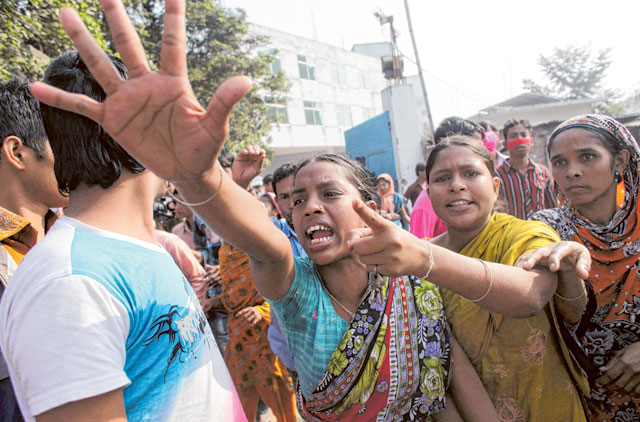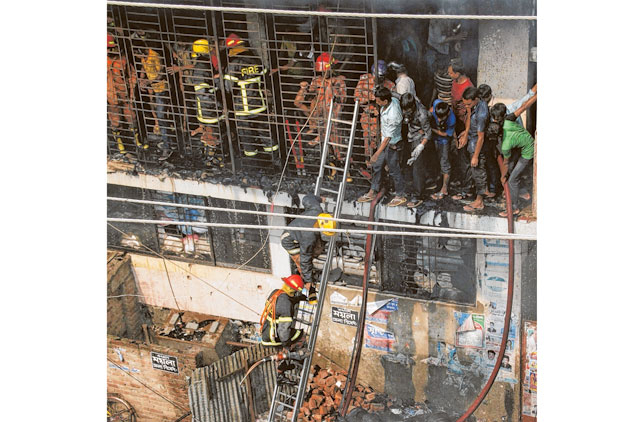
Dhaka: Thousands of Bangladeshi garment workers staged mass protests yesterday to demand the end to “deathtrap” labour conditions after the country’s worst-ever textile factory fire, as experts and activists called on global apparel brands to take responsibility for working conditions in Bangladeshi factories that produce their clothes.
The protests came as firefighters doused a fresh factory fire at the outskirts of the capital Dhaka, a day after the blaze killed 112 people at suburban Savar.
Ahead of the first of a series of mass funerals for the 112 victims, survivors of the deadly blaze joined several thousand colleagues to block a highway and march in the manufacturing hub of Ashulia.
“Workers from several factories have left work and joined the protest. They want exemplary punishment for Tazrin Fashion’s owners,” said Dhaka police chief Habibur Rahman, referring to the factory where the blaze broke out late Saturday.
Police said Ashulia’s more than 500 factories, who make apparel for top global retailers ranging from Wal-Mart, H&M and Tesco to JC Penney, Kohl’s, Marks & Spencer and Carrefour, declared a wild-cat “holiday”, fearing that the protests could worsen and turn into large-scale unrest.
Officials and witnesses said the blaze yesterday had no casualties as most workers jumped to safety from the 10-storey building housing three garment units, while dozens of fire engines rushed to the scene.
The cabinet of Prime Minister Shaikh Hasina has announced a day of national mourning Tuesday over the casualties at Tazrin. Officials said two separate inquiries were on and police had opened a “murder case” after the incident attributing it to “criminal negligence”.
Several rights groups and experts attributed the Tazrin tragedy to lack of safety standards and flimsy fire audits.
But the director general of the fire services, retired Army Brigadier General Abu Nayem Mohammad Shahidullah, denied the allegation saying he rather feared “sabotage” to have caused the tragedy to “frustrate the country’s rapidly growing ready-made garments” [RMG] sector. “The RMG units comply with the safety standards also because of pressures and vigilance from buyers… Our initial enquiry shows that Tazreen Fashion authorities had all required equipment in place along with three separate staircases so workers could quickly escape the scene,” he told Gulf News.
Eyewitnesses, however, said the factory had no emergency fire exits and many workers were burnt alive.
Bangladesh’s garment industry, the second-largest exporter of clothing after China, has a notoriously poor fire safety record. Experts say many of the fires could have easily been avoided if the factories had taken the right precautions. Many factories are in cramped neighbourhoods and have too few fire escapes, and they widely flout safety measures.
Activists say that global clothing brands such as Tommy Hilfiger, Gap and those sold by Wal-Mart, Carrefour and Tesco need to take responsibility for the working conditions in Bangladeshi factories that produce their clothes.
“These brands have known for years that many of the factories they choose to work with are death traps,” Ineke Zeldenrust, the international coordinator for the Clean Clothes Campaign, an anti-sweatshop advocacy group in Amsterdam, told the New York Times. “Their failure to take action amounts to criminal negligence.”
Tensions have been running high between Bangladeshi workers, who have been demanding an increase in minimum wages, and the factory owners and government. A union organizer, Aminul Islam, who campaigned for better working conditions and higher wages, was found tortured and killed outside Dhaka this year.
In March 2012, PVH Corp., which markets Tommy Hilfiger and Calvin Klein, signed an agreement with Bangladeshi unions, international unions and other labor rights groups to develop a fire safety programme to prevent future deaths in the garment industry.
Walmart spokesman Kevin Gardner said the company is trying to determine if the factory has a current relationship with Wal-Mart. “Our thoughts are with the families of the victims of this tragedy, he said. “Fire safety is a critically important area of Walmart’s factory audit programme and we have been working across the apparel industry to improve fire safety education and training in Bangladesh,” Gardner said.
German newspaper Abendzeitung said in a report yesterday that Carrefour SA and Walmart had been customers of Tazreen Fashion.
— With inputs from AFP & Reuters













